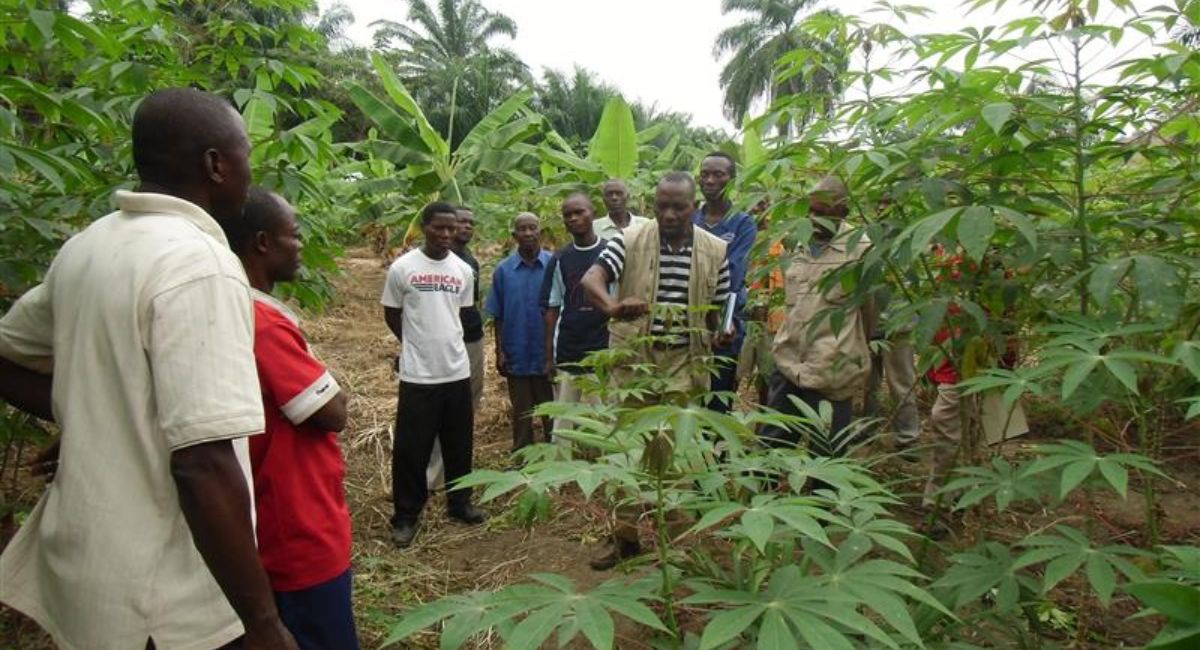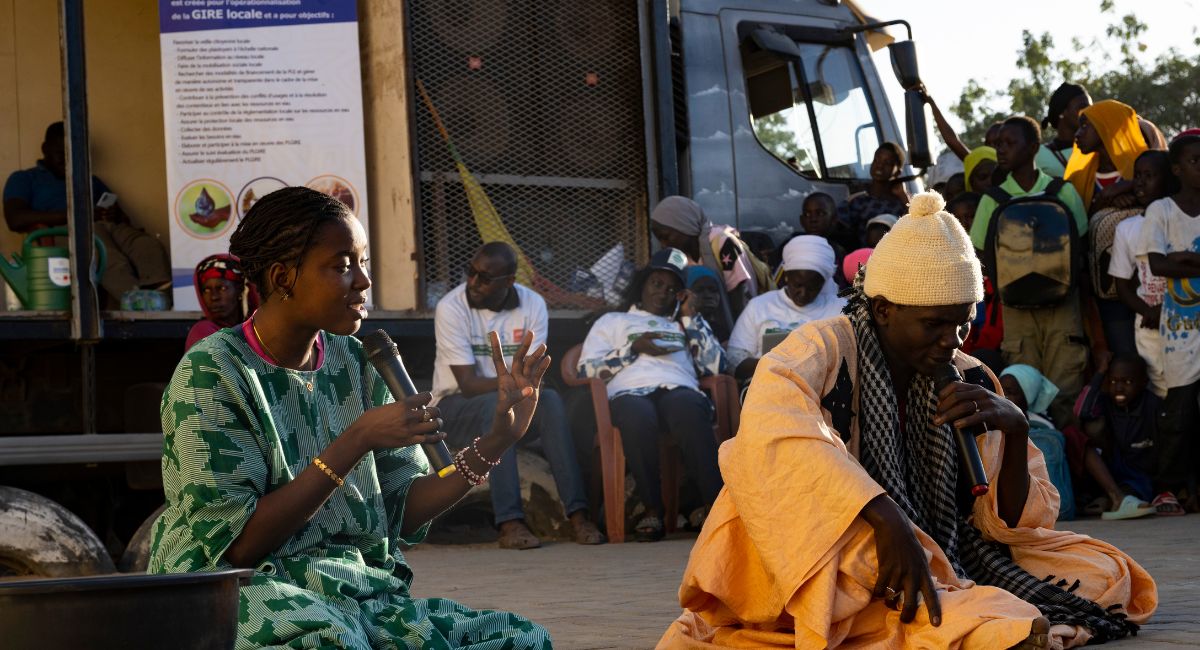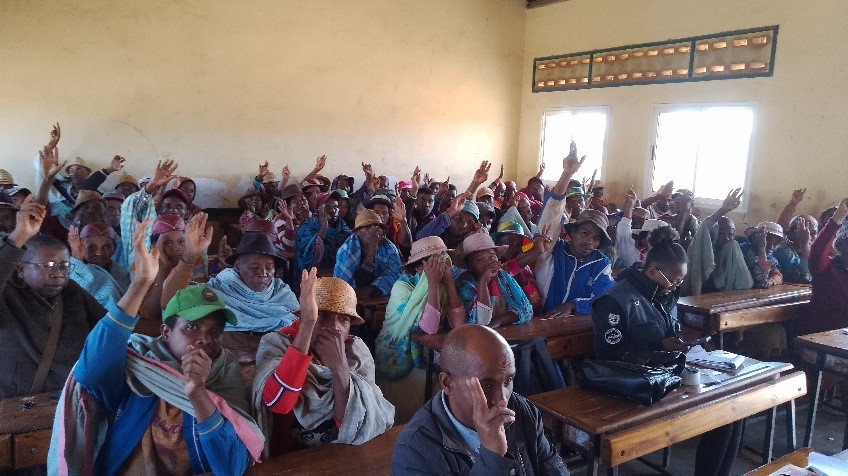Given the legitimacy crisis official development aid (ODA) is going through, how is it possible to continue responding to an increasing number of social and environmental emergencies across the world? The commons-based approach, with its opportunities and its constraints, has been tested in development projects. Can it provide solutions for international solidarity?
On 8 April 2025, a round table organised at the end of the first six years of the Commons & Shared governance action-research programme conducted by GRET with CIRAD and funded by Agence française de développement (AFD), brought together five participants working in different domains: Stéphanie Leyronas, research officer (AFD), Flamay Ahiafor, project manager in Togo (GRET), Hervé Defalvard, an economist and Julie Lequin, a researcher, who are both members of the Coop des Communs, and Martin Viélajus, a consultant working in the area of governance, International cooperation and strengthening of civil societies, who was the programme evaluator in the last three years. Together, they debated the following question: “the commons-based approach: which type of official development assistance for which type of development?”. A look back on the issues and reflections that were raised at this round table.
Official development aid: does the framework of action need to be reshaped?
Official development aid is necessary now more than ever to respond to ecological, social and democratic emergencies. Yet, it is currently under threat. Alongside an increasing level of isolationism in the public space, there is a focus on three dimensions of ODA, which partly explains this legitimacy crisis.
Firstly, there is the conception of ODA policies, constructed around three premises: that of a developed centre and an under-developed periphery that needs to catch up, and imitate hegemonic western modernity; that of traditional society as the opposite of modern society, which is therefore incapable of being innovative; and that of social change that can only be promoted from the outside.
The societal models conveyed by ODA are based on the values of progress, western rationality, control over nature, economic growth and accumulation of capital. Models that are being challenged today because of their incompatibility with the transformations that must be made to conserve the planet’s habitability.
Lastly, the operation of ODA is characterised by the implementation of projects that last between one and three years, mobilising management tools that reflect technical and managerial values, with measurement of results that prioritises quantitative indicators and deliverables.
These three dimensions would seem to make ODA increasingly inappropriate to respond structurally and sustainably to the challenges of our era.
The commons-based approach: solutions to address the challenges of ODA?
Principles of action rather than a simple methodological recipe to be followed, the commons-based approach consists of supporting the dynamics of the commons, where citizens, users, and public and private stakeholders concerned by a resource, a service or a territory, become mobilised to define, implement and develop governance procedures and rules making it possible to equitably conserve it over the long term, with a view to social and environmental justice. An approach that calls the vision of ODA, the model it promotes and its procedures into question.
A committed facilitator re-examining a “top-down” vision of Official Development Assistance
The commons-based approach repositions the development as a “committed facilitator”. The project team supports stakeholders to formulate and implement their own collective trajectories, requiring expertise that is complementary to technical expertise: the expertise of an actor supporting social dynamics.
This position is illustrated by GRET’s experience in Togo, where the team supports the implementation of concerted water management in communes in the Lake Togo watershed, in a context of decentralisation and growing tensions between water users. “Here, the commons-based approach consisted of reassuring state actors that these spaces are not a threat, a place of demands, but rather a channel to prevent tensions and conflicts”, explains Flamay Ahiafor, project manager at GRET. “It also consisted of confirming with users that their common is the water resource, mapping and understanding power relationships, and defining the participation quota and decision-making methods to foster freedom of expression. The main difficulty lies in mobilising industrials. GRET’s position is that of a proposer. Stakeholders adopt what they consider to be best for them. This generates trust in GRET”.
When evaluating the programme, Martin Viélajus highlighted the fact that all parties agreed that the commons-based approach incited them to “exceed routines of artificial, instrumental participation so that stakeholders are involved over the long term”. For Stéphanie Leyronas of AFD, the approach is very different to participative governance, and very different to community development policies implemented in the 1970s: “it is very powerful in terms of moving away from the top-down versus bottom-up dichotomy”.
Promoting and supporting the model of a society “in common”
The commons-based approach promotes and supports dynamics where stakeholders become organised to take care of objects for which they share responsibility and use: groundwater, water service, wet zones, forests, protected areas, etc.
It invites project operators to examine the mechanisms of collective action, shared governance, fair regulation, reflexive monitoring (monitoring of the common by stakeholders in the common), and collective learning, more explicitly integrating citizen mobilisation into reflection and action, as well as the role of public and private authorities, their constraints and interests, and power relationships. All these levers are often blind spots in development projects. The Commons programme considers they are relevant and useful to better respond to social, ecological and democratic challenges.
The commons-based approach promotes the creation of a specific space for the construction of new institutions between populations and public authorities. “This space must be agile, adaptive, experimental and open to mistakes”, says Stéphanie Leyronas. Flamay agrees with this: “Rather than a solution to be achieved, the objective is to have a process”, says Flamay Ahiafor. “This requires a lot of time, contrary to the short-term approach to projects”.
Re-examining official development aid procedures
The commons-based approach, in its intention (the commons), the position it generates (that of a committed facilitator), and the resources it requires (long period, attention focused on the process, experimentation and iterative learning), in fact re-examines the management tools used by official development aid.
Paradoxically, it is in this context that GRET is testing commons-based approaches. This points to a contradiction: who defines the common? Who expresses the need? How can the tension between the endogenous and flexible trajectory of the common and the rigidity of project frameworks be overcome? Is there a risk that the commons will be redefined to obtain results?
By clearly displaying its role as a supporter of commons dynamics and a vehicle of a political intention working towards greater social justice, “the commons-based approach re-positions the development project as a tool to achieve wider meaning”, observes Martin Viélajus. In doing this, it also enables “reflection on a grey area regarding the localisation of ODA: the position of international stakeholders and their complementarity with local dynamics”.
The commons-based approach could provide a significant contribution to reflections underway on the necessary evolution of development aid, so that it can fully play its role as a catalyser of democratic changes for greater social justice, conservation of living environments, resilience and world peace. However, this requires a deliberate change of course, political recognition of the importance of the commons, and a will to tackle the structural causes of inequalities. In short, it means having the courage to choose a different approach to development and acquiring the means to implement it.
Initiatives taking commons-based approaches, here and elsewhere
The commons-based approach is not only tested in the context of ODA. The commons also exist in France. Economist Hervé Defalvard tells us how associations such as La Coop des Communs, are interested in how “these commons operate – in a non-determinist, legally equipped manner – and can be co-constructed with local authorities”.
Julie Lequin supports the Association of Rural Mayors in France (AMRF) to apprehend the notion of the commons in order to respond to very concrete preoccupations, for example mobilisation around ecological transition based on the territory’s sociology, or how to develop modes of interaction between mayors and citizens when recourse to petitions is sometimes a sign of dialogue that has broken down. The notion of the commons gives visibility to “rural mayors’ preoccupations and the impossibilities they encounter regarding the revitalisation of democracy in their territories”.
Similarities in terms of challenges and initiatives to address them were also highlighted during the Rencontres Faire commun sur l’eau, ici et ailleurs meetings organised in 2024 by GRET and Remix the Commons, with support from Fondation de France. These observations contribute to re-examining the idea of ODA moving from the northern hemisphere to the southern hemisphere, advocating rather for dynamics of territorial solidarities that benefit all, without conveying a unique commons-based approach model, recognising that the values underpinning this approach are situated contextually and cannot be imposed.
The nine-year Commons & Shared governance programme (2019-2028), which takes an action-research approach and has been tested in some ten countries, focusing on a broad range of subject areas, puts forward the hypothesis that the commons are forms of organisation that are relevant and effective to take care of living environments and foster social and environmental justice. It opens up valuable margins for manoeuver to formulate and test a commons-based approach, thereby observing interdependencies, power relationships, and collective processes of learning and decision-making around access to, use and conservation of natural resources, essential services and territories.
The programme also puts forward the hypothesis that it is possible to support commons dynamics as part of official development aid (ODA), through projects conducted by NGOs: a chance to question new challenges and opportunities provided by the commons-based approach to think about fairer, more sustainable development models and international cooperation procedures.




